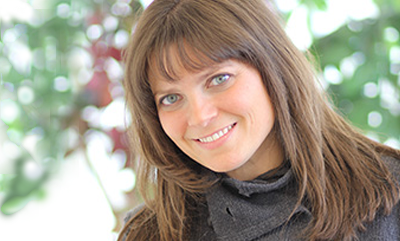Professor Brings Practical Applications to Intro Course.
 It’s a challenge faced by public health schools across the country: Students are younger and less experienced—many right out of undergrad and unsure of their interests—while the field requires more experience than ever.
It’s a challenge faced by public health schools across the country: Students are younger and less experienced—many right out of undergrad and unsure of their interests—while the field requires more experience than ever.
And so in SB 721, “Social and Behavioral Sciences for Public Health,” a required course for all MPH students, Clinical Assistant Professor of Community Health Sciences Jacey Greece has replaced the traditional final assessment—an exam—with a semester-long case study.
“Let’s show them what goes on in the field!” says Greece. “Let’s give them tangible, current problems so they can acquire the knowledge and skills necessary for the field.
“In education, we need to practice what we preach.”
To mimic the public health workplace, the class was divided into multi-disciplinary groups, each working with a different issue faced by Boston-area public health agencies: prescription drug use in youth, chlamydia prevention in college students, obesity and food access in youth of color, and social smoking among Arabic women.
The idea was to provide real-world experience right out of the gate, building a foundation for success in later courses as well as future careers.
Greece had brought real-world work into more advanced—and smaller—courses before, where a class could serve as a consulting firm for one of the many public health organizations in the Boston area. The arrangement is mutually beneficial, with students gaining experience and making connections, while understaffed organizations receive solutions to public health problems from students with the latest training.
In a required survey class of more than 60 students, would case studies fit?
“It was very organic,” says student Alyssa Harlow, whose group assessed obesity and food access in a summer youth program. She calls the case study much more engaging than a traditional assignment: “We actually took those skills and applied them to a real problem.”
Greece, along with teaching assistants Sarah Kensky and Kate Festa and then-Community Health Sciences Academic Coordinator Joanne Patterson, conducted a retrospective evaluation to see if the change was effective. It showed that Harlow’s experience was common.
In an online survey, the majority of students reported being satisfied with the culminating case study.
“More students three months post-course said they were able to apply what they learned in the course,” Greece says.
Greece and her colleagues have since published “Incorporating Practical Application in Graduate Introductory Public Health Courses” in On the Horizon . Assessing the benefits of a case study approach, the study authors wrote: “The majority reported that practical application allows for development of problem solving skills, enhancement of understanding of course material, makes them more marketable in their future career, and helps clarify future career plans.”
Or, as Harlow says, “I’m not just jumping in blindly.”